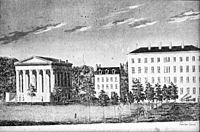Lane Seminary facts for kids

Campus of Lane Theological Seminary
|
|
|
Other name
|
Lane Theological Seminary |
|---|---|
| Type | Private seminary |
| Active | 1829–1932 |
| Affiliation | Presbyterian |
| President | Lyman Beecher (1832–1852) |
|
Academic staff
|
Calvin Stowe, Baxter Dickinson |
| Location |
,
,
45206
,
United States
39°7′48.62″N 84°29′17.84″W / 39.1301722°N 84.4882889°W |
Lane Seminary, also known as Lane Theological Seminary, was a special school for training Presbyterian religious leaders. It was open from 1829 to 1932 in Walnut Hills, Ohio, which is now part of Cincinnati. The school's campus was located where Gilbert, Yale, Park, and Chapel Streets are today.
The people who started Lane Seminary wanted it to be a very important religious school in the western United States. They hoped it would become as famous as Andover or Princeton. However, the early years of Lane Seminary were quite challenging and led to big disagreements.
The Great Debate on Slavery
One of the biggest events at Lane Seminary was a huge disagreement about slavery. Students wanted to talk about slavery publicly, but the school's leaders were worried. Cincinnati was very close to the Southern states, where slavery was common. Many enslaved people who escaped and freed people passed through Cincinnati. This created tension, and there had even been conflicts in the city, like the Cincinnati riots of 1829, due to competition for jobs.
To avoid more trouble, the school's leaders quickly told students they could not discuss slavery in public anymore. This decision led to a large number of students leaving the seminary. This event is seen as one of the first major times that the idea of academic freedom was challenged in America. Academic freedom means that students and teachers should be allowed to discuss important topics openly, even if they are controversial.
Famous People Who Attended Lane Seminary
Many notable individuals studied at Lane Seminary before it closed. Here are a few:
- Edward H. Allen, who became the Mayor of Kansas City.
- Henry Ward Beecher, a famous speaker and writer, who attended in 1837.
- Jonathan Blanchard, who was against slavery and later started Wheaton College.
- John Gregg Fee, another person who worked to end slavery and founded Berea College.
- James C. White, who became a minister.
 | Shirley Ann Jackson |
 | Garett Morgan |
 | J. Ernest Wilkins Jr. |
 | Elijah McCoy |

